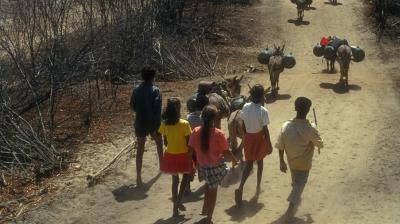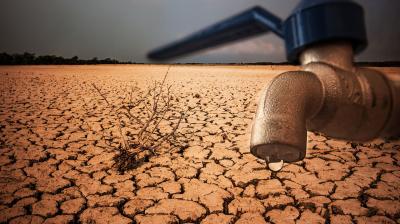Drought Resilience: Global Collaboration to Help Countries to Prepare
Drought is one of the most insidious climate-related hazards, disproportionately impacting vulnerable groups

The Drought Resilience +10 Conference, hosted by WMO in Geneva from 30 September to 3 October 2024, called for global collaboration to find actionable solutions to address the escalating threat of drought and water scarcity worldwide. Drought is one of the most insidious climate-related hazards, disproportionately impacting vulnerable groups, food security, public health, and ecosystems. The Conference aimed to reflect on the successes and challenges in drought risk management over the past decade, following the 2013 High-Level Meeting on National Drought Policy, and to discuss how to achieve drought resilience in the coming years.
Some 1 000 Conference participants planned how to scale-up drought resilience efforts in view of the increasing intensity and frequency of such events due to climate change. They aimed to engage with decision-makers to raise awareness, mobilize resources and prioritize integrated drought management strategies to improve resilience. Their discussions addressed key aspects of drought management, reflecting the central challenges and opportunities for building drought resilience globally. The Conference recommendations will guide global drought policy and action over the next decade, these include:
- Drought resilience and global alignment - There is a need to strengthen international collaboration on drought risks and align efforts across frameworks like the Paris Agreement of the United Nations Framework Convention on Climate Change, Sendai Framework for Disaster Risk Reduction 2015–2030, and United Nations Sustainable Development Goals (SDGs)
- Drought risk governance - Drought risk management needs to shift toward an integrated systems approach, embedding sustainable land management and integrated water resources management into national and regional drought policies
- Drought monitoring, impact assessments and forecasting - There is a need for better monitoring, prediction and systematic collection of impact data, including for cascading and compounding impacts, as well as fast-moving flash droughts, to address key challenges
- From policies to action - All stakeholders are encouraged to mobilize resources, catalyse political will, and operationalize national drought plans
- Ecosystems - Drought resilience strategies should prioritize ecosystems, focusing on water quality, groundwater management, and the protection of aquatic habitats
- Social inclusion and climate justice - Drought disproportionately affects marginalized groups, including women, youth, Indigenous Peoples, and communities in remote and rural areas. The Conference called for intersectoral, gender-transformative, and whole-of-society approaches to be integrated into national drought policies
- Drought finance - Stakeholders and private entities are encouraged to increase financial flows to drought resilience projects. Emphasis was put on innovative financing mechanisms, including private sector engagement and youth-friendly funding
- Public-private-civil society partnerships - Stakeholders should be open to new approaches to foster innovative partnerships
- Health - Help public health systems prepare for drought-associated health risks by enhancing understanding of how drought impacts environmental, economic and social determinants of health, as well as direct or indirect effects on human health.
Drought action is central to sustainable development, climate adaptation and to providing Early Warnings for All. The Integrated Drought Management Programme (IDMP) and the International Drought Resilience Alliance (IDRA) will play a key role in scaling up drought efforts in line with the recommendations, with a focus on transboundary cooperation, public-private partnerships, and the integration of drought resilience into global climate adaptation strategies.
The outcomes of the Conference informed the global drought community as well as the high-level discussions at the 16th Conference of Parties (COP16) to the United Nations Convention to Combat Desertification in December 2024, where drought resilience was a central theme.









